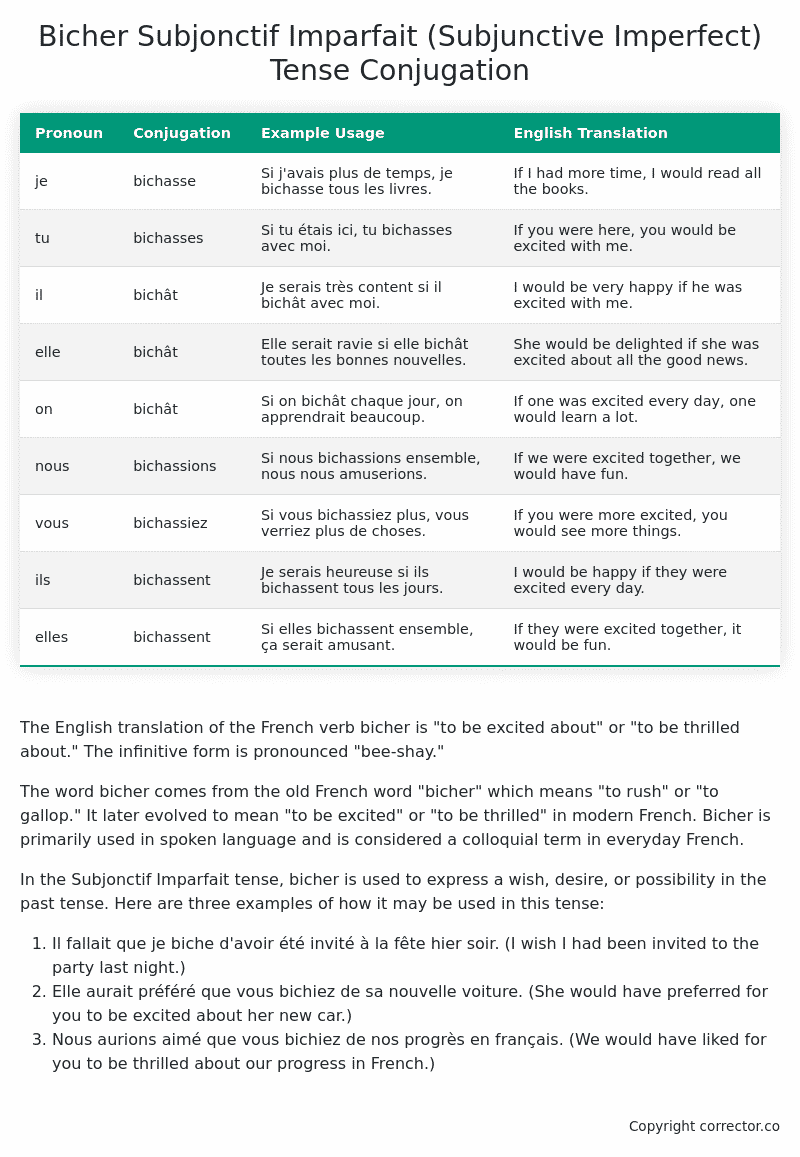Subjonctif Imparfait (Subjunctive Imperfect) Tense Conjugation of the French Verb bicher
Introduction to the verb bicher
The English translation of the French verb bicher is “to be excited about” or “to be thrilled about.” The infinitive form is pronounced “bee-shay.”
The word bicher comes from the old French word “bicher” which means “to rush” or “to gallop.” It later evolved to mean “to be excited” or “to be thrilled” in modern French. Bicher is primarily used in spoken language and is considered a colloquial term in everyday French.
In the Subjonctif Imparfait tense, bicher is used to express a wish, desire, or possibility in the past tense. Here are three examples of how it may be used in this tense:
- Il fallait que je biche d’avoir été invité à la fête hier soir. (I wish I had been invited to the party last night.)
- Elle aurait préféré que vous bichiez de sa nouvelle voiture. (She would have preferred for you to be excited about her new car.)
- Nous aurions aimé que vous bichiez de nos progrès en français. (We would have liked for you to be thrilled about our progress in French.)
Table of the Subjonctif Imparfait (Subjunctive Imperfect) Tense Conjugation of bicher
| Pronoun | Conjugation | Example Usage | English Translation |
|---|---|---|---|
| je | bichasse | Si j’avais plus de temps, je bichasse tous les livres. | If I had more time, I would read all the books. |
| tu | bichasses | Si tu étais ici, tu bichasses avec moi. | If you were here, you would be excited with me. |
| il | bichât | Je serais très content si il bichât avec moi. | I would be very happy if he was excited with me. |
| elle | bichât | Elle serait ravie si elle bichât toutes les bonnes nouvelles. | She would be delighted if she was excited about all the good news. |
| on | bichât | Si on bichât chaque jour, on apprendrait beaucoup. | If one was excited every day, one would learn a lot. |
| nous | bichassions | Si nous bichassions ensemble, nous nous amuserions. | If we were excited together, we would have fun. |
| vous | bichassiez | Si vous bichassiez plus, vous verriez plus de choses. | If you were more excited, you would see more things. |
| ils | bichassent | Je serais heureuse si ils bichassent tous les jours. | I would be happy if they were excited every day. |
| elles | bichassent | Si elles bichassent ensemble, ça serait amusant. | If they were excited together, it would be fun. |
Other Conjugations for Bicher.
Le Present (Present Tense) Conjugation of the French Verb bicher
Imparfait (Imperfect) Tense Conjugation of the French Verb bicher
Passé Simple (Simple Past) Tense Conjugation of the French Verb bicher
Passé Composé (Present Perfect) Tense Conjugation of the French Verb bicher
Futur Simple (Simple Future) Tense Conjugation of the French Verb bicher
Futur Proche (Near Future) Tense Conjugation of the French Verb bicher
Plus-que-parfait (Pluperfect) Tense Conjugation of the French Verb bicher
Passé Antérieur (Past Anterior) Tense Conjugation of the French Verb bicher
Futur Antérieur (Future Anterior) Tense Conjugation of the French Verb bicher
Subjonctif Présent (Subjunctive Present) Tense Conjugation of the French Verb bicher
Subjonctif Passé (Subjunctive Past) Tense Conjugation of the French Verb bicher
Subjonctif Imparfait (Subjunctive Imperfect) Tense Conjugation of the French Verb bicher (this article)
Subjonctif Plus-que-parfait (Subjunctive Pluperfect) Tense Conjugation of the French Verb bicher
Conditionnel Présent (Conditional Present) Tense Conjugation of the French Verb bicher
Conditionnel Passé (Conditional Past) Tense Conjugation of the French Verb bicher
L’impératif Présent (Imperative Present) Tense Conjugation of the French Verb bicher
L’infinitif Présent (Infinitive Present) Tense Conjugation of the French Verb bicher
Struggling with French verbs or the language in general? Why not use our free French Grammar Checker – no registration required!
Get a FREE Download Study Sheet of this Conjugation 🔥
Simply right click the image below, click “save image” and get your free reference for the bicher Subjonctif Imparfait tense conjugation!

Bicher – About the French Subjonctif Imparfait (Subjunctive Imperfect) Tense
Formation
Common Everyday Usage Patterns
Interactions with Other Tenses
Subjonctif Présent
Indicatif Passé Composé
Conditional
Conditional Perfect
Summary
I hope you enjoyed this article on the verb bicher. Still in a learning mood? Check out another TOTALLY random French verb conjugation!


